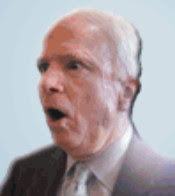In the above video, a questioner at a McCain town hall meeting asks McCain, "Is it true you called your wife a cunt" in public?
In his book The Real McCain, author Cliff Schecter claims that John McCain made extremely ugly remarks about his wife Cindy McCain during a tirade witnessed by three reporters and two aides. "At one point, Cindy playfully twirled McCain's hair and said, 'You're getting a little thin up there,'" Schechter writes. "McCain's face reddened, and he responded, 'At least I don't plaster on the makeup like a trollop, you cunt.' McCain's excuse was that it had been a long day. If elected president of the United States, McCain would have many long days." Drudge Report
In the above video, McCain does not deny the accusation, but instead says the question is inappropriate at a town hall meeting. If so, then it would also be inappropriate to hurl that epithet at your own wife in front of a bunch of reporters, a public meeting with the media, right?
The US Supreme Court has declared that "a person accused of crime in a public forum would ordinarily deny or explain the evidence against him if he truthfully could do so". If he doesn't deny an accusation made in public, it may well be because the accusation is demonstrably true and all denials would be futile.
And therefore,. . . failure to explain or to deny by his testimony any evidence or facts in the case against him may be commented upon by the court and by counsel, and may be considered by the court or the jury. GRIFFIN v. CALIFORNIA, 380 U.S. 609 (1965)The Comments to the Federal Rules of Evidence say that:
(B) Under established principles an admission may be made by adopting or acquiescing in the statement of another. While knowledge of contentsIf someone asked me in public whether, in public, I had called my wife a "cunt", then I would certainly deny it unless it were manifestly and undeniably true. If you apply the above rule to McCain's failure to deny a damning accusation in the above video, it can only mean that McCain DID call his wife a "c*nt". If he denies it, he know the public will find out the truth between now and the election, and then he'll be proved a straight-up liar as well as an abusive cad to his wife.
would ordinarily be essential, this is not inevitably so: "X is a
reliable person and knows what he is talking about." See McCormick Sec.
246, p.527, n.15. Adoption or acquiescence may be manifested in any
appropriate manner. When silence is relied upon, the theory is that the
person would, under the circumstances, protest the statement made in his presence, if untrue. The decision in each case calls for an evaluation
in terms of probable human behavior. FEDERAL RULES OF EVIDENCE ADVISORY COMMITTEE

.jpg)

No comments:
Post a Comment